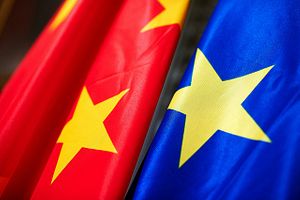China-EU ties appear to be suffering from a marked public-private dissonance of late. High profile statements of cooperation continue to fill headlines, belying tensions over how to move the complex relationship forward. A Wall Street Journal story this week revealed that the China-Europe Trade Forum, a dialogue between business leaders, officials, and academics, set for last month was canceled following Chinese requests to exclude certain participants. It’s just the latest indication that not all is well between Beijing and Brussels.
Still, as 2020 draws to a close, there is much ado about the potential of finally concluding a China-EU investment agreement. The investment deal is seven years in the making and marked its 35th round of negotiations this week. Chinese media are actively pushing a hopeful message, with the Chinese ambassador to the EU stating the deal will be closed “by the end of the year” and headlines reporting “breakthroughs” and “strong signals.”
The deal was one of the top priorities in separate conversations China’s Xi Jinping had with France’s Emmanuel Macron and Germany’s Angela Merkel in the past several weeks. Both conversations included standard diplomatic speak with commitments to broad initiatives ranging from the economy to climate change. And yet, each also contained statements from Xi highlighting the importance of exchange between China and the European bloc, perhaps also designed to alleviate recent discord. Xi framed China’s ongoing efforts to open up internationally as an opportunity for Germany, while expressing his hope that “Germany and the European Union (EU) will be open to Chinese enterprises.” In a Xinhua readout of Xi’s call with Macron, the Chinese leader stated his “hopes that the EU will implement a positive policy towards China.”
Exchanges between China and the European Union and its members have not all shared a tone of solidarity. In fact, in September, the virtual meeting that replaced what would have been a high profile in-person summit between China and the EU reflected growing frictions on human rights and market access issues. At a post-meeting press conference, European Council President Charles Michel stated that “Europe needs to be a player, not a playing field.”
Tensions have not only become more palpable across the EU bureaucracy but also spread among European publics. Negative views of China have climbed significantly in recent years. Unfavorable views of China jumped to 85 percent in 2020 among survey respondents in Sweden, up from 49 percent in 2017. In Germany negative views reached a high of 71 percent, compared to 53 percent three years prior. Over the same time period, negative views toward China grew from 52 percent to 70 percent in France.
And yet, even with souring public evaluations of China, Europeans increasingly see the country as the world’s dominant economic power. In Italy, 57 percent identified China as the leading economic power, compared to 32 percent saying the same about the United States. Similar patterns were shared across other EU members – Germany, Belgium, the Netherlands and Spain – where the majority of respondents from these states chose China as the dominant force in the world economy.
These perceptions are also reflected in the latest data on the depth of China-EU economic ties. In the first three quarters of 2020, China-EU trade hit more than $517 billion, making China the European’s bloc top trade partner, surpassing the U.S. for the top spot.
Without a clear indication of the gravity of economic pain wrought by the coronavirus pandemic, a deepening of trade and investment between China and Europe seems to be inevitable. However, European leaders should develop a more balanced and unified approach vis-a-vis China across numerous policy areas, not only heeding the concerns of their publics, but also recognizing the need to reconcile the fissures among and divergent priorities of EU member states. As Zainab Zaheer suggests in China-US Focus, “The perceived German and French dominance of the relationship needs to come to an end, perhaps by enforcing more participatory measures for other member states. In order to demand concessions from China, the EU needs to present a united front.”

































